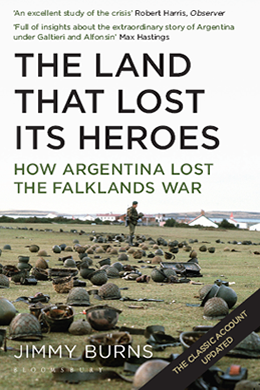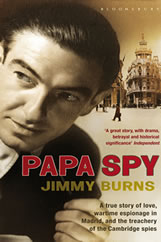This is the book the late Graham Greene managed to read in manuscript form on his way to Moscow to visit his old friend Kim Philby. Greene – always generous with young aspiring authors – subsequently wrote to me saying: “You can quote me as saying this is a required book for anyone who wishes to understand the Argentine situation before and after the Falklands War.’ My first book is the result of journalistic good luck: of being in the right place at the right time. I was posted to Buenos Aires in December 1981, and was the only full-time British foreign correspondent to remain in Argentina in the lead-up to the Falklands War, the three-month military conflict which involved Europe, the US, South America, the Middle East, and the Soviet Union in diplomacy, trade sanctions, spying, and secret arms deals. It was the last conventional military campaign of the 20th century in which British troops in defence of UK territory, against one of the world’s bloodiest dictatorships.
This book gives a detailed account of the military planning of the invasion of the Falklands by Argentina, and the hidden motives and nature of the regime responsible for the bold aggression against a NATO power. It exposes the international intrigue involving US President Ronald Reagan and his ally Margaret Thatcher, and the covert military operations including a daring British special forces attack on the South American mainland. With unrivalled access to all sides involved in the conflict, I also narrate the human drama of Argentina’s military occupation of the Falkland Islands, a piece of England in the South Atlantic that stuck up for its human rights. This revised and greatly expanded paperback version of the original book that won the Somerset Maughan prize for non-fiction, contains new chapters detailing the murky world of intelligence and Argentina’s secret missile programme which linked Buenos Aires to Saddam Hussein’s Baghdad Colonel Qadafi’s Libya.
I hope this has become not just a standard work for military historians, but will appeal to new readers who have lost faith in war and diplomacy as experienced in the 21st century, and might value an important point of reference. This was a war that had a beginning, a middle, and an end, and in which soldiers and people defended just causes.
Related links:



I may have only been 9 at the time but i still remember BBC Radio’s famous Goose Green “announcement”, the tears from a British Naval commander and the state of the nation at that time… Will look out for your book. Un abrazo.
I must confess that i did not read your book until now. I found it fascinating and very enlightening. Page 235, Alphonsin and Caputo played the Junta’s game…Malvinas cause to boost domestic support. The charming Kirchiner doing the same and now the unexplained death of Nisman. En Francais “plus ca change etc” What is the expression in Spanish!
Un abrazo
Chris!
La expresión en español puede ser “es preciso que todo cambie para que todo siga igual”